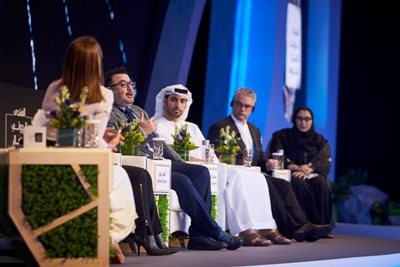 Themed ‘The Role of Social Media Platforms – From Participation to Real Partnership’, a panel discussion featuring communication specialists examined the role of social media in enabling governments to better communicate with their citizens on the second day of the sixth International Government Communications Forum (IGCF 2017).
Themed ‘The Role of Social Media Platforms – From Participation to Real Partnership’, a panel discussion featuring communication specialists examined the role of social media in enabling governments to better communicate with their citizens on the second day of the sixth International Government Communications Forum (IGCF 2017).
Eminent panellists included His Excellency Saeed Saleh Al Remeithi, Member of the UAE Federal National Council, Dr Nicholas Christakis, Director of the Human Nature Lab at Yale University, Ashraf Zeitoon, Founding Partner and Chief Innovation Officer at Diplomacy Labs, and Ediola Pashollari, Secretary General of the World Assembly of Youth (WAY) and Director of World Youth Institute (WYI).
Social media platforms have changed the way governments worldwide interact with their citizens. This is particularly true in the MENA region that has witnessed a very high growth rate in social media use, presenting an opportunity for governments to reach out to their citizens faster and more effectively than ever before.
Speaking on current trends in social media, Dr Nicholas Christakis said: “The behaviour we are witnessing on social media is actually based on the ancient human tendency to interact and engage with one another. First, social media is not just a tool for the dissemination of information – it can be used to affect people’s behaviour. A second trend I have observed in modern social media interactions is that for someone to influence users, the online relationship must feel real and authentic. Finally, we have now gone beyond searching for people who are influential online, and also focus on finding people that are easily influenced.”
He warned against the potential threats of social media, where a lie can spread faster than the truth. He called on governments and officials to develop the means to expose fake news, and spread the real stories.
Drawing on his experience as a social media influencer, Saeed Saleh Al Remeithi has seen a major change in online behaviours. He said: “Today, we are witnessing a much more authentic environment online. This increased transparency is what has made social media such an essential communication tool. Some countries’ refusal to share decision and policy making with the youth is illogical, especially after the country had benefitted from social media in reaching the youth.”
He emphasized the need for each organisation to introduce an official spokesperson across platforms, who would then serve as a credible source of information for the public, as well as respecting the privacy of the target audience.
Highlighting an example of effective online government communication, Ashraf Zeitoon said: “In the UAE, we have several success stories. One of the key examples that comes to mind is the social and traditional media strategy adopted following a fire in a Dubai hotel. The hotel’s media office aptly contained the crisis and turned it into a success story. Whenever something happens, governments need to keep in mind that every second there are more than 6,000 tweets sent out. It is therefore critical that governments convey their message online, otherwise they will leave the door open for others to promote their own perception of things. Arab authorities are still hesitant but I am confident that the opportunities are much greater than the threats.”
Focusing on the impact of social media on the youth, Ediola Pashollari said: “In the UAE, the youth represents 60 per cent of the population. Governments must therefore consult the youth before implementing policies, and social media represents the perfect medium to enable this two-way communication. In addition, it can encourage the youth to create public opinion on important international issues. However, online platforms are not without their risks, and the youth are particularly susceptible to believing fake news and rumours and becoming victims of bullying. Therefore, we need to educate children at a young age about these risks to ensure that they are protected.”
Themed ‘Societal Participation…Comprehensive Development’, IGCF 2017 examines how the world’s nations can leverage effective government communication to achieve the United Nations’ sustainable development goals (SDGs) that have become the top priority of government programmes, international institutions, media organisations and civil society.
Offering a transparent platform to examine current issues and formulate recommendations to help governments optimise the impact of their communication, IGCF 2017 convenes more than 2,500 local and international personalities from the ranks of government officials, experts, thought leaders, and government communication professionals.


